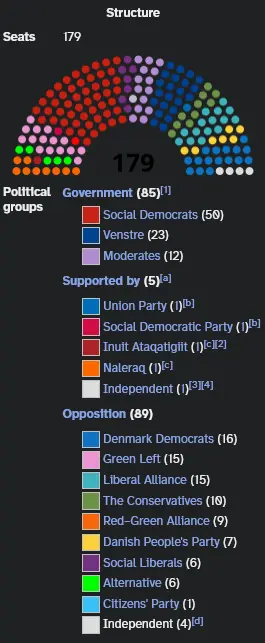You’re only able to choose two options, how is that democracy? I thought democracy was about being able to choose anyone you think is suitable to be a leader, not one of two pre-selected people. At that point, it’s not much different to a one-party system, just with two people rather than only one person.
That’s not what democracy is.
Democracy is simply a system of government where leaders are voted on instead of inheriting their title or gaining it through physical force and coercion.
The original form of democracy had slavery, and excluded women and non-land owners, the word simply distinguishes which mechanism brings someone to power, it doesn’t inherently imply fairness or free choice.
I would say that’s a good definition
that’s why in many european states we’ve evolved to variants of multi party, transferable votes systems
it still has inherent flaws and it still seems to have 2 sides (one side kinda sorta has to be the majority “in power”, and the others in opposition) but it feels and maybe is more representative of the vote we cast
maybe it’s due to the inherent human“us vs them” mentality. the “us vs them” thing really causes a lot of problems :<
Not so sure about that. It’s adversarial in nature but that’s not a bad thing. It means we keep changing hopefully for the better for everyone
It’s not like the two party system is deliberately chosen or enshrined in law. The field naturally winnows down to two parties because that is basically guaranteed to outcompete every other possibility under a first-past-the-post voting system. You want to fix the two party system, you need to fix our voting system.
Derek from Veritasium also made a great video about the various voting systems and which one seems to be the most democratic: https://youtu.be/qf7ws2DF-zk
I hope to someday see a Rated Choice ballot.
This. This. This.
Everyone should watch this. Even people who know about rank choice voting.
Ranked choice is fine, but it’s never going to end the two party system on its own. We can already see in some states (Alaska and Maine) and in some smaller municipalities in the US, and in countries outside the US, which have switched to RCV after having a 2-parety system that it doesn’t end the 2-party system. At best, it makes campaigning a little less negative.
People tend to simplify the concept of 3rd parties when thinking about RCV. They get it in their head that everyone who dislikes the 2 major parties would all vote for the same 3rd party as a first choice under RCV. In practice, that’s not how it works. Most people still vote for one of the major parties as their top choice. Among those who don’t, they are extremely divided in which 3rd party they pick. People who traditionally vote Republican but don’t really like them may be willing to vote Libertarian, but their never going to vote Green. Likewise, someone who doesn’t really like the Democrats but typically votes for them might prefer the Green Party or DSA or something, but they’re not voting Libertarian or Freedom Party.
When RCV is implemented in a 2-party system, what almost always happens is that the first choice 3rd party vote gets split among a number of different 3rd parties, giving none of them enough votes to win. When those get dropped in the first round of instant run-offs and those votes switch to the 2nd choice, one of the 2 major parties almost always wins.
If you want to get rid of the 2-party system, you need to get rid of single-member congressional districts. Switch to multi-member districts with proportional representation. Say a state gets 5 Representatives to the House. Each party (including 3rd party) puts forth up to 5 candidates all running in the same race. Everyone votes for either their preferred candidate or preferred party (you can even implement RCV here to rank candidates if you want). Then seats are allocated to each party based on which proportion of the vote they get. If the Green party gets 20% of the vote, they get 1 seat. If Republicans get 40%, they get 2 seats, etc, etc. The specific candidate(s) who wins from each party would be whoever got the most votes within that party.
This almost eliminates strategic voting. You don’t have to worry that your party is small with nowhere close to a majority support because you don’t need a majority to win a seat. Nearly everyone gets the representation they want.
I think rank choice will result in third party but it will take some time. Our republic system does make it slower though compared to parliamentary systems.
I appreciate your optimism, but I do not share it and have seen no evidence to support it.
I mean maine is the only state with possibly enough time to possibly have any effect. Remember that the senate only turns over every 6 years for a position. They have two senators and two reps and one is independent, but that was the case before. What we see there is incumbents continuing to win but given their reps I don’t see this as surprising. It will make a bigger difference when its more contested. If it came to illinois it would give duckworth difficulties because of her military and security voting. Honestly given our executive ignoring the courts im not sure if its going to matter much unless we get back to a somewhat working system in general.
Completely agree on that last point. I don’t really expect we’ll see completely fair and open elections in this country for a while, if ever again.
Yes for some theory about this, see:
fair enough
I also love this YouTube video, which covers this extremely well - https://youtu.be/s7tWHJfhiyo
There is nothing limiting it to two parties. honestly its first past the post that is more of an issue.
We somehow have more than 2 parties in Canada even with FPTP. And yeah, it sucks. The left’s vote, in particular, gets carved up into tiny pieces and the conservatives take advantage of that all the time. We desperately need voting reform and it occasionally gets dangled in front of us, only to be shot down. Kind of like high speed rail, which is being dangled again of late.
If you watch the video you’ll see that there’s an ongoing process that gradually eliminates parties until there’s only two remaining. Canada has been progressing along this path. There’s only one national conservative party of any note now, and on the left only the Liberals have any chance at forming a government. The NDP can only act as a spoiler for the left. Give it some time and the NDP will wither away, leaving only the Liberals and Conservatives.
I consider Trudeau’s betrayal of his electoral reform promise to be one of the worst political stabs in the back that has happened to the Canadian electorate in recent history.
And yet, in the upcoming election I’m going to vote Liberal. Hell, I’m probably going to do volunteer work for their campaign. Because in my particular riding the projections are currently a tossup between Liberal and Conservative, with the NDP having only a 1% chance of winning and no other party having any meaningful chance of winning. So in my riding Liberal and Conservative are the only choices that matter. The two party system has already arrived in the spot where I live.
I hate this. But I recognize the reality of the system I live in. This is basic game theory, voting third party would only harm my own interests.
The purpose of a system is what it does. If this wisdom was truly internalised by most people, there would be global revolution.
The purpose of a system is what it does
There’s a lot of stupid shit in philosophy, but this is one of the dumber beliefs.
Do you notice how what you just said is not a conversation starter or even a joke? What’s your goal here, just to talk shit? What’s your ideal outcome for leaving this remark, exactly? Do you even have one.
Calling out dangerously foolish rhetoric is a civic duty.
exactly
German is heading this way. Part of the vote is already FPTP and parties also have to have more than 4% of the vote to get a seat. In Brandenburg none of the small parties made it, and despite the SPD being the biggest party, the right wing is in charge, because all the other parties that got seats (BSW, CDU, AFD) are right wing and the SPD doesn’t have a majority.
What are you talking about? There are now six (6) parties in the Bundestag, that’s a long way from 2. If anything, it might be a bit much.
It’s… it’s so beautiful
Well… Yes but… oh go post a letter. ;)
Germany is actually trending the other way. Modern Parlaments have more parties than they did in the past.
Brandenburg only has 4 parties in parliament right now. The only reason the federal parliament has more is that Die Linke miraculously got lots of votes.
The United States is a one party state, but with typical American extravagance, they have two of them
Not quite verbatim, but that’s a quote from Julius Nyerere. Just for attribution’s sake if anyone is interested.
It’s only so to those whom have been conditioned to believe so
Many democracies form coalitions between smaller parties to create a majority voting block - the US just does it before the election.
As I’ve always said… do the coalitions for a party or do the parties for a coalition?
End of the day, what’s the difference?
I think it does make a difference. When the parties are voted for before forming the coalition, you know exactly how many people supported them and their policies. Then the coalition is negotiated based on that. If you form the coalition first, then only the majorities inside the coalition matter for who has the most say, you have no way of knowing what’s important to the voters.
It makes a ton of difference actually. I can speak for Norway, currently we have 9* parties in Parliament, 3 on the left, 3 on the right and 3 in the middle that could align themselves with either side, and they do flip from time to time.
If the coalitions formed beforehand we would very likely put the Communist Party in with the left, but Labour actually prefers to work with the Conservatives (their main rival) over the Communists most of the time.
More parties also gives way more nuanced choices, we have 3 parties that have environment and climate change as a top priority, one on the left, one on the right and one in the middle meaning that if climate change is your biggest concern we actually have real alternatives. To continue on the climate rail; the power realtion between the Liberal Party (right/green) and the Progress Party (hard right) will matter a lot if the Conservative party get form a government after the elections.
We see a lot of deals going across the traditional left/right line which makes the political process and campaigning a lot less toxic, and if some big issue is not raised by the big players some a smaller party can campaign on that or we can even start new parties.
*There’s also a non-party representative that in essence got elected to save a local hospital. Kinda wild that the locals got so pissed that enough of them “threw away” there votes to get her elected on a single issue.
That said, there are obviously problems with too many parties, but I think around 6-10 is probably good.
That’s exactly why so many countries around the world roll their eyes when America bangs on so much about democracy.
It’s a marketing thing. Look around the world. Find any country with the word “Democratic” in the name, and odds are you’ll find a poor excuse for a democracy.
The actual democracies in the world don’t feel compelled to keep repeating the fact.
The reality is that America is only really a democracy in the loosest sense of the world. All you need to do is look at how often the wealthiest candidate wins to see that it’s true. Or how often the person with the most votes loses. Or how unregulated lobbying actually is. Or the insane amount of power the President actually has. The power doesn’t lie with the people - it lies with the super-rich.
Sorry if that came off as really negative! America has a lot of good stuff going for it, but its implementation of democracy is not one.
How often in US democracy does the person with the most votes lose? Even just on the national level, there are several hundreds of people elected every other year.
If you mean the Presidential election, it has only happened 5 times in 200 years.
True, but it’s happened twice in the last six presidential elections. The fact that the system allows it at all is problematic, but it’s unfortunately becoming more common, not less.
that makes sense. Honestly, I don’t think it’s really possible to get a perfectly fair system of democracy as everyone has different opinions, making it really difficult to make everyone happy. Nothing is perfect and humans are greedy, unfortunately
I have a passing familiarity with the politics of a couple countries, and they all fit this pattern: their constitutions say nothing of a two-party system, they don’t even say anything about parties at all. People just choose to create political parties, and then those parties coalesce into two major parties.
The reason that this happens is because people, from voters to every level of politician, look at the rules of the game and make tactical decisions; their tactical decisions cause a two-party system to emerge.
The USA is a really extreme case of this; in Europe there are more parties, and they even very occasionally come to power. Current french president Macron broke a decades-long streak of two-party governance in his country.
Further viewing material:
Minority Rule: First Past the Post Voting
The Alternative Vote Explained
My takeaway from this is that there are things that can be done to improve the voting system, as suggested in these videos; but i don’t even like representative democracy at all, i think there’s better solutions in direct democracy (referendums and such). Representative democracy was designed to put elites in charge, voting was initially reserved for land-owning nobility. Extending voting rights to more people doesn’t change what the system is designed to do.
Referendums are called propositions in the US and are voted on at the state level. Special interests pay tens or hundreds of millions of dollars for deceptive TV ads for or against propositions. The messages tend to be very dumbed down because the average person is too stupid to vote for anything beyond a simple slogan.
Direct democracy leads to a lot of idiot things getting done. Representative democracy was better for a while, but you still get Nazis coming to power from time to time.
Churchill had it about right:
Many forms of Government have been tried, and will be tried in this world of sin and woe. No one pretends that democracy is perfect or all-wise. Indeed it has been said that democracy is the worst form of Government except for all those other forms that have been tried from time to time.…’
yeah, voting on the actual policies and laws rather than the people in charge might be more fair.
You aren’t forced to vote for those two parties.
Short answer is capitalist propaganda. The illusion of freedom is important to maintain control and curb resistance.
Edit: my mom was a school teacher and she taught me a trick for manipulating children that is similar. Instead of telling a kid to do something like" little mark do your homework." You give them two choices both of which will satisfy your agency. Like “little mark would you like to do your math homework first or your English?” Which is super equivalent to would you like a democrat or a Republican? Also the only way one of those candidates can get to be one of the last binary choices is completely dependent on financial backing which almost always comes from the capitalist class.
A top-two runoff system is considered democracy. A system where the two parties are just the same thing, like in North Korea, is not.
Americans consider their two parties as very flexible about what they stand for. If there is a big enough group not represent by the incumbent, the other parties’ primary will be biased towards this group.
What we saw this time around, though, was two incumbents running against each other with no room for the non-represented group to be reflected. Thus, to that group at least, it felt like there was no difference (at least in the represtation).
Those that believed that there was no difference are now finding out how much of a difference it was - and they are now yearning for another vote to fix things.
Because someone with a lot of money released a ton of propaganda to make people believe this was ever a democracy.
Honestly, democracy is incomplete without economic democracy. You could have a million political parties but it wouldn’t matter because all of them would still support the supremacy of the bourgeosie. Those with actual power, the business owners who control all of our material resources, would not allow them to exist otherwise. We never had democracy but this is only just now becoming apparent to the general populace because the fascists have made themselves obvious and the liberals have only enabled them.
A two-party system is not necessarily worse than a multy-party system. They both have their flaws. Just as one example, party programs in multi-party systems such as in Germany are not worth the paper they are written on, because after the election the parties will go into negotiations and come up with an entirely different program. With two parties, at least you know what you vote for.
This is a great lecture on the topic with much more depth to it:
Because the monied interests in charge of the two-party system want you to think it is













